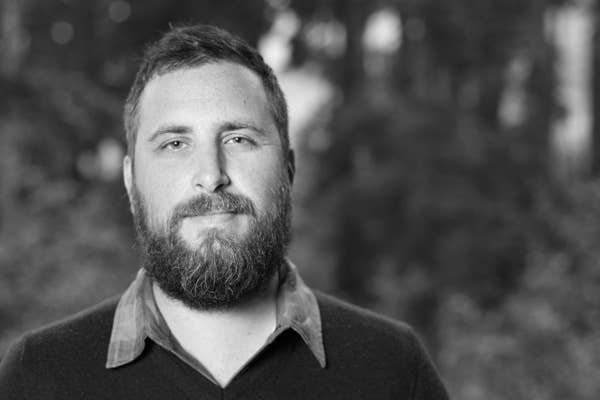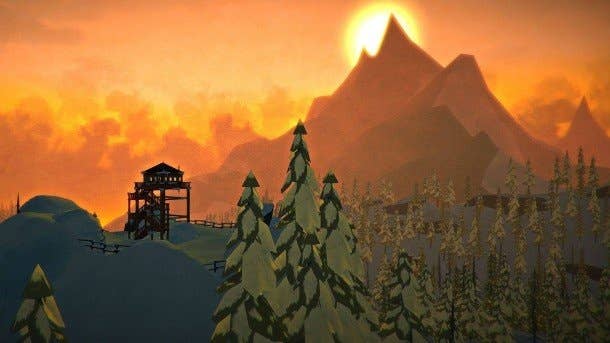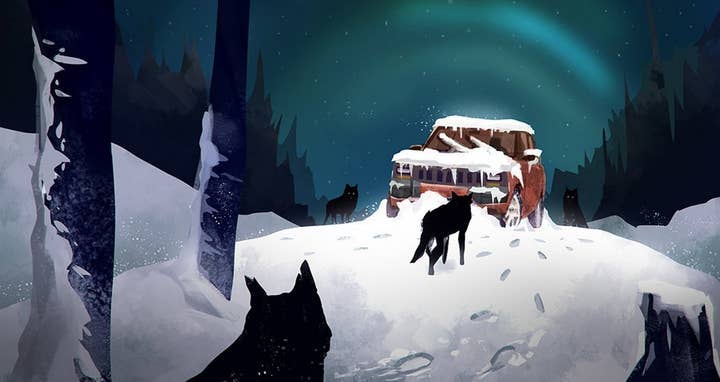Hinterland: Navigating Early Access with The Long Dark
"It's our job to not be waylaid by all the feedback. Because that's what we do. We're game developers"
Accessibility and abundance are watchwords of the contemporary games industry. Rough skills and scant resources are no longer insurmountable barriers for anyone with the desire to make a game. In 2015, there is an engine, a storefront and a funding platform for almost every set of circumstances. One need only look at the App Store's brimming inventory, or Google Play, or, increasingly, Steam. There's no shortage of interested parties, and so there's a surfeit of games.
This means diversity and choice, of course, but there is an unmistakable aura of chaos to these digital platforms. When I looked ahead to the future suggested by Braid and Castle Crashers and World of Goo, it was independent, idiosyncratic and boundlessly creative, a response to the many tastes and predilections that the commercial games industry simply couldn't address. That future came to pass, but it's now difficult to see in anything more than glimpses, through the gaps and breaks in an endless onrush of new products.
"You need to be open to feedback, but also very firm in your vision and stubborn to some degree"
Difficult, that is, but not impossible. The Long Dark, for example: the passion project of a small, highly experienced team of developers who earned their stripes at big studios like Relic, Volition and Riot Games, made possible by money, feedback and support secured through Kickstarter and Early Access. Hinterland's debut project is a demonstration of both the commercial and creative opportunities afforded to digital game developers. It is what I hoped for when those first indie blockbusters hit.
For Hinterland's core team, The Long Dark represents both a new way of working and a new way of thinking. In his time as a console developer, Raphael van Lierop, Hinterland's founder, was accustomed to making games, "in the dark." Big decisions were made and big money was spent in isolation from the audience. In that context, the smartest bets are the safest bets, and decisions against originality and expression become a practical necessity.
Van Lierop's last AAA job prior to forming Hinterland was as game director on Relic's Warhammer 40,000: Space Marine. He was playing through an early build one evening, when his wife, watching over his shoulder, observed how little of her husband's passionate, erudite thinking about the medium was evident in the games he actually made. Space Marine shipped to a warm critical reception in September 2011, but by that time van Lierop had already departed the studio. He founded Hinterland in May of the following year.

The Long Dark could scarcely be more different than Space Marine, which was linear, ballistic and gratifyingly brutal, a fine example of the kind of game that once occupied the wrung beneath Call of Duty, Halo and the other titans of the industry. The question Hinterland set out to explore with its first project was essentially a riposte: "Could you make a compelling experience that is almost totally about exploration, with very little action, if any?" There would be no enemy horde. Threats to the player would arise organically, from the landscape, the wildlife, the elements, and the protagonist's own fragile body. The Long Dark's emotional payoff would be both richer and more personal than the 'fun' for which virtually every other game strived.
The concept that would have been culled at every major publisher, and yet The Long Dark found nearly 7,000 Kickstarter backers, and surpassed 300,000 sales after just six months on Steam Early Access. Hinterland knew that it was pushing an intrinsically non-commercial idea, yet it had resonated to a degree that none of them expected. In part, Hinterland had been formed on a handful educated assumptions about the gaming audience; now it had the proof that those assumptions were entirely correct. After years of working in the dark, Hinterland had a direct line to an under-served niche, and access to a vast pool of potential testers and critics. It was, van Lierop recalls, overwhelming.
"Acknowledge that people don't always know what they want. They think they know what they want"
"The challenge is that now you have thousands - and in our case, hundreds of thousands - of players who all have opinions about the game," he says. "You need to be open to feedback, but also very firm in your vision and stubborn to some degree. When you have a lot of people yelling at you about something that they don't like, not only do you feel like you should listen to that, but it can erode your confidence about what you're trying to do. Sometimes you need to step back and plug your ears a little bit."
Kickstarter and Early Access offer myriad advantages, but the cumulating pressure of that chorus of opinion shouldn't be underestimated. Hinterland's team had the sort of belief that only comes with experience, and that served as a bulwark against the furore. Not every team will have that confidence in their own instincts, and in its absence it becomes tempting to put faith in the customer always being right. For van Lierop, that can be a costly and irreversible mistake.
"Acknowledge that people don't always know what they want," he says. "They think they know what they want.
"We had an intention coming into this, and it's our job to preserve that intention. That's why people supported the project to begin with. It's our job to not be waylaid by all the feedback, and to be focused on delivering the experience that we believe in. Because that's what we do. We're game developers. We've put 10, 15 years of our lives into learning how to do this."

Van Lierop describes the importance of having "first principles" for the experience you want to create, landmarks by which an Early Access developer can judge the hundreds of decisions that lie ahead. With The Long Dark, the imperative to adhere to those first principles became more acute with time. When the project started DayZ was still an obscure ARMA 2 mod, and van Lierop was more enraptured by Cormac McCarthy's The Road than any particular game. But by the time Hinterland hit its funding target on Kickstarter DayZ was the apex predator in a new wave of survival games that were popular among The Long Dark's target audience. There was a clear risk that well-meaning players could pull the project towards common ground.
"Some people play The Long Dark because they've played a lot of DayZ. They want to try something that looks different or has some different mechanics, but what they really love is DayZ," he says. "They come to your game, they play it, and they like what's different about it. But the more they play it the more they want it to be multiplayer, and the more they want it to have the zombies, and the more they want to be like DayZ.
"We were going against the grain on a lot of different levels: gameplay, aesthetic, tone, everything. We knew that was going to limit our reach at the end, but we were comfortable with that. It was a choice. It was more important to make this game than it was to make a really successful, popular game. In the end it's been both. I'm not saying we've done DayZ numbers, but we're doing something that's resonating with people. That's heartening."
"It was a choice. It was more important to make this game than it was to make a really successful, popular game"
Hinterland resisted the pressure to add popular features and more viscerally gratifying systems. The experience that launched on Early Access was already polished and satisfying in its own right, and while The Long Dark has become more complex and nuanced over time, it has never been anything other than the game Hinterland envisioned. Van Lierop believes that this consistency has built trust between the development team and the players. Hinterland has defied the wishes of the vocal minority before, and it has generally been the right call.
And there is another vital aspect to that resonance. The Long Dark is that rare thing: an Early Access game with a defined end-state. The alpha version hit Steam in September 2014, and there were already enough prominent failures and disappointments to have soured some parts of the community. Van Lierop could see that, whether by design or by negligence, most Early Access games were journeys without a destination. No matter how strong the start, players and developers seemed to lose the will to continue in tandem, any momentum gradually ebbing away.
Hinterland's AAA instincts were crucial once again. When you're building that kind of game, van Lierop says, the process is defined by deadlines: for a particular mission, for a vertical slice, for a certain milestone, for the final release. Historically, shipping the finished version of a game has been an essential part of the developer's identity, but Early Access has blurred the line between 'unfinished' and 'finished' to the point where it can seem irrelevant. That can be a useful way to look at design, van Lierop says, but it can also be dangerous.
"We've always had a focus on shipping because that, ultimately, is what you do. You're going to ship it at some point and you're going to share it with people. We're very focused on that," says Van Lierop.
"But I think that there are teams that have grown up on Early Access. And when you're on Early Access and you have a community and you're selling every day - even if you don't do anything, you're still selling every day - I can understand why some people might get into that mindset. Like, 'I don't want to break the game, it's selling, it's fine. I don't really know where to take it to the next step.'
"I'm not justifying it, but I can see how you might get lost."

The Long Dark provides fertile ground for emergent stories, but Hinterland wanted to tell a story of its own. And not just because the confluence of authored narrative and survival sandbox was both ambitious and unique, but because it would also mark, "a finite line where we can say: 'It's done.'" That sense of progress is important to a studio's internal culture, but the way Early Access functions doesn't push developers beyond that 'playable sandbox' state.
"Some games in Early Access in this genre, there's never going to be anything more," van Lierop says. "They'll update and improve over time but they're not moving towards some event where it's going to be finished and launched. I actually think this is really working against the model.
"The old way, where everything was about the launch, had it's own problems. I think what we're doing now is better in the sense that we're not working in the dark, we have feedback, we can get a validation, we can test. That's very, very important, but we've always been clear: 'Story mode will be a separate thing, it's not going to launch in Early Access.' We have a lot of people that are waiting anxiously for the Story mode to come out before they jump on board.
"Launch is very important. Not just from a business standpoint, but from a creative standpoint"
"Launch is very important. Not just from a business standpoint, but from a creative standpoint, and for the players to know that this is the definitive moment where the game becomes something else."
Exactly what that means for The Long Dark remains obscure, both in the details of its episodic Story mode and in Hinterland's long-term plans for its future. Internally, the team has discussed their broad vision of a huge experience divided into seasons, with this first chapter representing only the winter. If the commercial winds keep blowing in Hinterland's favour, we could yet see The Long Dark move into spring, summer and autumn, the game evolving and changing as the story unfolds.
All of that is a matter for the future, though, and right now Van Lierop and his team have good reason to be satisfied. The successful combination of old and new skills is a difficult task, one that defeats many developers seeking fresh opportunities in times of transition. Hinterland's team overcame that challenge with apparent ease, and it did so while making exactly the game it wanted to make.
"The team is wonderful," Van Lierop says, smiling. "We have a game that resonates with people. We have a road map and clarity as to the future. We have the means to plan out far enough ahead that we can really invest and make something really special. I think our work is just starting.
"I don't believe at all that this is the end. This is the beginning."

